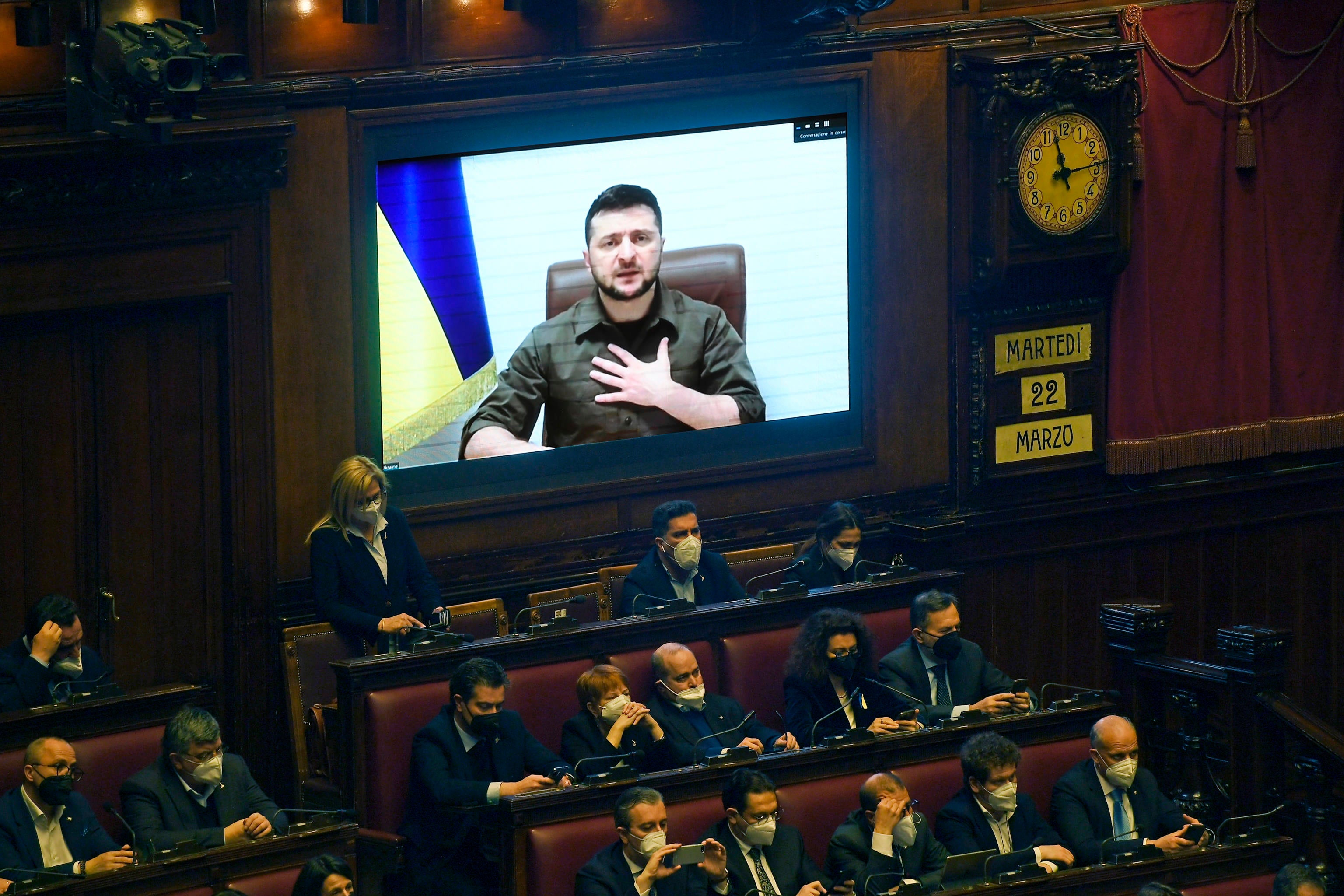What will become of Ukraine’s wish to be made a member of the EU?
It would involve a long road ahead, but membership would be a vote of confidence the Ukrainians desperately need, argues Kataryna Wolczuk

“Italy wants Ukraine to join the EU... I want to tell President [Volodymyr] Zelensky that Italy stands alongside Ukraine in this process.”
Those were the words of Italian prime minister Mario Draghi, after an address by the Ukrainian president to the country’s parliament on Tuesday. Draghi said Rome was determined to support “a path of greater closeness between Ukraine and Europe”.
Despite significant moves to support Ukraine militarily in the wake of the invasion by Russia, the EU is clearly divided over Ukraine’s wish to join the bloc.
Granting full EU membership could take decades to accomplish in practice and is largely symbolic – but acknowledging it would send a powerful message of solidarity. In contrast, denying it gives the perception that Ukraine is being in effect abandoned by its “European family”.
European integration was created with one goal in mind – to end warfare on the European continent. So successful was the EU in this regard that it came to regard itself as a geopolitical entity. But Russia’s invasion of Ukraine has caught the EU materially and institutionally completely unprepared. Firstly, up till now Russia had been accorded respect as a business partner. Secondly, Ukraine was treated, albeit benignly, as something of an irritation and, for some member states, a hindrance in a “Russia first” policy. The war means that both of these perceptions have been turned on their head. Russia has become a global business pariah while Ukraine has the potential to become the keystone in the European project.
For two decades, Ukraine has been part of the European Neighbourhood Policy (ENP). The initiative was aptly defined as a “bureaucratic answer to the geopolitical question of boundaries of Europe”. Including both the neighbours of Europe (in the south) and the European neighbours (in the east) the ENP lacked a clear vision and incentives to achieve its lofty aspirations of “stability and prosperity”.
The association agreement between the EU and Ukraine – ratified in 2017 – which is very long and highly technical, is not underpinned by any long-term political vision. On its own it doesn’t offer a viable roadmap and enticing stimulus for European integration. And therein lies Ukraine’s problem: the agreement is a means to an end in terms of membership, while for many in the EU the agreement functions exactly as it intended – to bypass the tricky discussion of membership.
In the wake of Russia’s aggression against Ukraine in the Crimea and Donbas, the EU adopted a “business as usual” attitude: there has been no political upgrade beyond the already negotiated association agreement. This doesn’t mean that relations have been stagnant: in particular, there has been some excellent work done by the EU to promote fundamental reforms in Ukraine, a truly innovative and pioneering approach. Yet, in broader geopolitical terms, the EU’s eastern policy has been scaled down in scope and ambition since 2014.
Russia’s invasion has brought the limits of the EU’s technocratic focus when confronted with aggression and war into sharp relief. Nothing evidences this more than the calls by a number of European countries for Ukraine to be granted membership. And the fact that the European parliament adopted a resolution calling for granting Ukraine a “candidate status”.
In the current context, it is clear that the association agreement with Ukraine is no longer adequate to address the challenges facing the EU, or Ukraine.
Ukrainian officials know only too well what full membership entails. The association agreement – despite all its weaknesses – has provided a formidable learning curve for Ukraine. Being mindful of the western Balkan experience, they know only too well that without reforming Ukraine, all the plans and perspectives will remain loud words, and jeopardise Ukraine’s “return to Europe”.
Even with a long road ahead, membership would be a vote of confidence the Ukrainians desperately need. Any proposed upgrades along the line of “association plus plus” would be a mere technocratic placebo and would hardly counterpose Russia’s actions in any meaningful way.
Confronted with Russia’s aggression, I believe the post-Soviet countries are losing their faith in the west in general and the EU in particular. Tellingly, only two states voted in support of the UN’s resolution on Ukraine: Moldova and Georgia – the countries with association agreements and membership aspirations. Other post-Soviet countries in Europe and Central Asia appear to feel they cannot openly condemn Russian aggression, even though their societies feel massive solidarity with Ukraine.
At no other time since its inception has the EU been confronted with such a stark attack on peace and stability in Europe and the challenge to live up to its own lofty rhetoric. The people across the member states have responded with unprecedented acts of solidarity with and support for Ukraine.
But as award-winning Ukrainian writer Yuri Andrukhovych bitterly observed on the EU’s arms-length position on Ukraine more than a decade ago: “Perhaps Europe is simply scared? Perhaps it is scared of Europe, of its very self? Perhaps it closes itself off from us for the very reason that we took its values too close to heart, that these values have become ours? For in reality, this Europe could not care less for these values these days.”
If he is proven right, the lack of this symbolic act of support for, and solidarity with, Ukraine will be a blow to the EU’s standing as an international actor, and, in the longer term may even threaten the cohesion of the EU itself.
Kataryna Wolczuk is an associate fellow in the Russia and Eurasia programme at Chatham House






Join our commenting forum
Join thought-provoking conversations, follow other Independent readers and see their replies
Comments